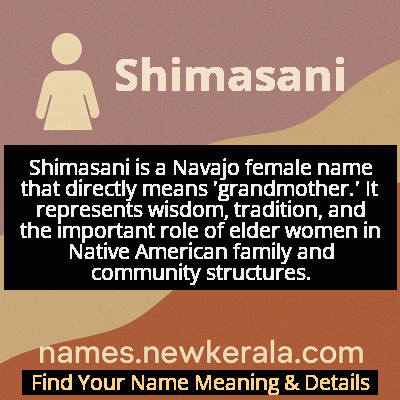Shimasani Name Meaning & Details
Origin, Popularity, Numerology Analysis & Name Meaning of Shimasani
Discover the origin, meaning, and cultural significance of the name SHIMASANI. Delve into its historical roots and explore the lasting impact it has had on communities and traditions.
Name
Shimasani
Gender
Female
Origin
Native
Lucky Number
3
Meaning of the Name - Shimasani
Shimasani is a Navajo female name that directly means 'grandmother.' It represents wisdom, tradition, and the important role of elder women in Native American family and community structures.
Shimasani - Complete Numerology Analysis
Your Numerology Number
Based on Pythagorean Numerology System
Ruling Planet
Jupiter
Positive Nature
Optimistic, inspirational, and creative.
Negative Traits
Scattered, exaggerating.
Lucky Colours
Yellow, gold, purple.
Lucky Days
Thursday.
Lucky Stones
Yellow sapphire.
Harmony Numbers
1, 2, 9.
Best Suited Professions
Arts, writing, communication.
What People Like About You
Creativity, optimism.
Famous People Named Shimasani
Shimasani Nez
Navajo Weaver and Cultural Preservationist
Master weaver who preserved traditional Navajo rug patterns and taught weaving techniques to younger generations
Shimasani Begay
Community Elder and Storyteller
Renowned for preserving oral histories and traditional Navajo creation stories through generations
Shimasani Tsosie
Traditional Healer and Herbalist
Continues family legacy of traditional Navajo healing practices and medicinal plant knowledge
Name Variations & International Equivalents
Click on blue names to explore their detailed meanings. Gray names with will be available soon.
Cultural & Historical Significance
As respected elders, women bearing this name traditionally hold authority in family decisions, oversee ceremonial practices, and ensure the continuity of Navajo language and customs. The name reflects the deep respect for age and experience in Native American cultures, where elders are considered living libraries of cultural knowledge and spiritual guidance. This cultural role extends beyond biological relationships, as community elders often serve as grandmother figures to all children in their communities, providing guidance, discipline, and cultural education.
Extended Personality Analysis
Women named Shimasani are typically perceived as possessing nurturing, wise, and grounded personalities that reflect their name's meaning. They often exhibit strong maternal instincts, showing deep care and protection for family members and community. Their wisdom manifests through patience, good judgment, and the ability to offer sound advice drawn from life experience. These individuals tend to be excellent listeners who provide emotional support and stability during difficult times.
They often demonstrate remarkable resilience and strength, having weathered life's challenges while maintaining their cultural values and personal integrity. Their leadership style is typically gentle yet firm, guiding others through example rather than command. Many Shimasani-named individuals show a natural aptitude for teaching and mentoring, passing down knowledge and skills to younger generations with generosity and compassion. They value tradition while adapting to modern circumstances, creating bridges between ancestral ways and contemporary life, and often serve as cultural ambassadors within their communities.
Modern Usage & Popularity
In contemporary times, Shimasani continues to be used within Navajo and other Native American communities as both a given name and an honorific title. While not commonly found in mainstream name databases due to its cultural specificity, it maintains strong relevance in indigenous contexts. The name has seen renewed interest as part of cultural revitalization movements, with younger generations choosing traditional names to honor their heritage. It's often given to girls who are expected to carry forward family traditions or who are born into families with strong matriarchal lineages. The name appears in educational materials, cultural programs, and indigenous media, serving as a symbol of cultural pride and continuity. Its usage reflects a conscious choice to maintain Navajo language and identity in an increasingly globalized world, though it remains primarily within Native American communities rather than crossing over into mainstream naming trends.
Symbolic & Spiritual Meanings
Symbolically, Shimasani represents the enduring strength of matriarchal wisdom, the continuity of cultural traditions, and the nurturing foundation of family and community. The name embodies the concept of roots and foundation, much like a grandmother provides the emotional and cultural bedrock for her descendants. It symbolizes the bridge between past and future, carrying ancestral knowledge forward while adapting to contemporary realities. The name also represents resilience and survival, honoring the generations of Navajo women who preserved their culture through immense challenges, including colonization and forced assimilation. In a broader sense, Shimasani symbolizes the universal archetype of the wise elder, the keeper of stories, and the guardian of cultural memory, serving as a powerful reminder of the importance of intergenerational connection and the vital role elders play in maintaining cultural identity and community cohesion across all societies.

